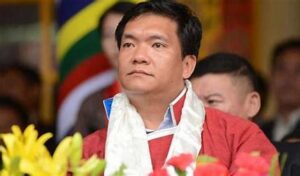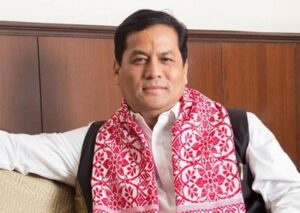Sarbananda Sonowal’s journey from the quiet village of Muluk Gaon in Assam’s Dibrugarh district to the corridors of power in Delhi is an inspiring tale of resilience, integrity, and unwavering public service. A grassroots leader whose political ideology is deeply rooted in the culture and aspirations of Assam, Sonowal has emerged as a respected statesman, not only in the Northeast but across India. His life story stands as a testament to the fact that committed leadership born out of local realities can rise to shape national progress.
Humble Beginnings in Muluk Gaon: The Foundation of Character
Born on October 31, 1962, into an Assamese Hindu Sonowal family, Sarbananda Sonowal was raised with traditional values, a strong sense of community, and a deep cultural identity. His father Jibeswar Sonowal was known for his commitment to social service, while his mother Dineswari Sonowal was the bedrock of the family. Among eight siblings, Sarbananda grew up witnessing the virtues of discipline, respect, and education.
His early schooling at Don Bosco High School, Dibrugarh, laid the first bricks of his academic journey. A keen student, he excelled in both academics and extracurricular activities. The lush green tea gardens and simple rural life of upper Assam greatly influenced his worldview, instilling in him a deep-rooted connection to nature and people.
Furthering his education, he obtained a B.A. (Hons) in English from Hanumanbax Surajmall Kanoi College, affiliated with Dibrugarh University, followed by a Bachelor of Laws (LL.B.) from Gauhati University, and a Bachelor of Criminal Justice (B.C.J.) from Dibrugarh University. These credentials gave him a sharp analytical mind, legal knowledge, and a well-rounded understanding of Indian society—all of which would later become central to his political life.
Early Activism and Leadership: The AASU Years
Even in his student years, Sonowal exhibited natural leadership skills and a strong sense of justice. These attributes came to the forefront during his involvement with the All Assam Students’ Union (AASU)—a pivotal organization that represented the voice of Assamese youth during the politically turbulent years of the Assam Agitation in the 1980s and ’90s.
As a key figure in the movement, Sonowal stood for protecting the identity and rights of indigenous people, especially concerning the influx of illegal immigrants. His efforts to challenge the Illegal Migrants (Determination by Tribunals) Act, popularly known as the IMDT Act, reflected his legal prowess and firm ideological stance. The landmark Supreme Court verdict that struck down the IMDT Act in 2005 was largely driven by his petition, earning him the title of “Jatiya Nayak” (People’s Hero) from AASU.
From 1992 to 1999, he served as President of AASU, and concurrently from 1996 to 2000, he was the Chairman of the North East Students’ Organisation (NESO). These formative years were crucial not just for his personal growth, but for strengthening his image as a leader who listened, led with purpose, and stayed connected with the grassroots.
Transition into Mainstream Politics: From AGP to BJP
Sarbananda Sonowal’s political career began with the Asom Gana Parishad (AGP), a regional party that emerged from the Assam Movement. His tenure with AGP gave him insights into regional governance and identity politics. However, Sonowal sought a broader platform to effect change and joined the Bharatiya Janata Party (BJP) in 2011—a move that would reshape his political destiny.
As a member of the BJP, he quickly ascended through the ranks. His deep understanding of Northeast India, combined with his ability to articulate regional concerns on national platforms, made him an asset to the party. He served as Member of Parliament (MP) for Dibrugarh (2004–2009) and later for Lakhimpur (2014–2016). During these years, he made significant contributions to parliamentary debates, particularly on border security, cultural identity, and youth empowerment.
In 2014, he was appointed as the Union Minister of State for Sports and Youth Affairs, under Prime Minister Narendra Modi’s leadership. This role marked his first major step onto the national stage, where he promoted sports infrastructure development and youth programs, especially in the Northeast.
Chief Minister of Assam: A Legacy of Transformation
The year 2016 marked a historic milestone when Sarbananda Sonowal became the first BJP Chief Minister of Assam. This victory was not just political; it was symbolic of Assam’s aspiration for a corruption-free, development-oriented, and secure future.
As the 14th Chief Minister, he focused on core issues that had long plagued the state:
- Combating illegal immigration: Building on his legacy from the AASU days, his government worked towards implementing the National Register of Citizens (NRC), aiming to identify genuine citizens and curb illegal migration from neighboring regions.
- Development and Connectivity: Infrastructure received a major boost. Road, rail, and air connectivity saw significant improvement. Projects like the Bogibeel Bridge, Northeast India’s longest rail-cum-road bridge, became symbols of progress.
- Healthcare and Social Welfare: Under his leadership, Assam witnessed the introduction of welfare schemes such as Orunodoi, aimed at providing financial aid to economically vulnerable women. Healthcare services in rural areas were also prioritized.
- Cultural Preservation: He promoted initiatives to preserve Assam’s rich traditions—be it through Bihu festivals, Sattriya dance, or indigenous handicrafts. His government championed both tangible and intangible heritage conservation.
Sonowal’s leadership was often described as clean, transparent, and visionary, earning him accolades across party lines.
Return to the Centre: Union Ministerial Roles
Following his tenure as Chief Minister, Sarbananda Sonowal was once again entrusted with national responsibilities. In 2021, he was appointed as Union Cabinet Minister, handling two vital portfolios:
- Minister of Ports, Shipping, and Waterways
- Minister of AYUSH (Ayurveda, Yoga & Naturopathy, Unani, Siddha, and Homeopathy)
In these roles, he has displayed strategic acumen and administrative capability:
- Modernizing India’s Maritime Sector: Under his leadership, projects like Sagarmala and Maritime India Vision 2030 received momentum. He emphasized the development of inland waterways, port-led industrialization, and the digital transformation of port operations.
- Promoting AYUSH: Sonowal has been at the forefront of integrating traditional systems of medicine into mainstream healthcare. He has pushed for global recognition of Ayurveda and yoga, while also strengthening AYUSH research and infrastructure domestically.
His efforts align with the broader Atmanirbhar Bharat (Self-Reliant India) vision. By emphasizing regional development, especially in the Northeast, he’s working to integrate these states into the national economic framework more effectively.
Championing the Northeast: A Constant Endeavor
A recurring theme in Sonowal’s journey has been his commitment to the upliftment of Northeast India. Whether in his role as CM or Union Minister, he has consistently advocated for:
- Improved road and rail connectivity between Northeast and the rest of India.
- Skill development programs tailored to the youth of the region.
- Tourism promotion that celebrates the Northeast’s diverse tribes, landscapes, and traditions.
- Business and investment opportunities through special economic zones and trade corridors.
His leadership bridges the gap between regional aspirations and national development, positioning the Northeast as a gateway to Southeast Asia under India’s Act East Policy.
Legacy of Service: A Life of Purpose and Impact
Sarbananda Sonowal’s life story is not just about climbing the political ladder—it is about steadfast commitment to justice, equity, and the holistic progress of his people. From his roots in Muluk Gaon to his influence on the national stage, every step has been marked by visionary thinking, administrative discipline, and cultural pride.
Today, he continues to be a guiding force, especially for the youth of Assam and the Northeast. As a leader who listens, a reformer who acts, and a visionary who inspires, Sonowal represents the transformative power of public service grounded in community values.
His journey—from being a student leader to a Chief Minister and now a Union Minister—stands as a symbol of hope and possibility for countless Indians striving to make a difference.






